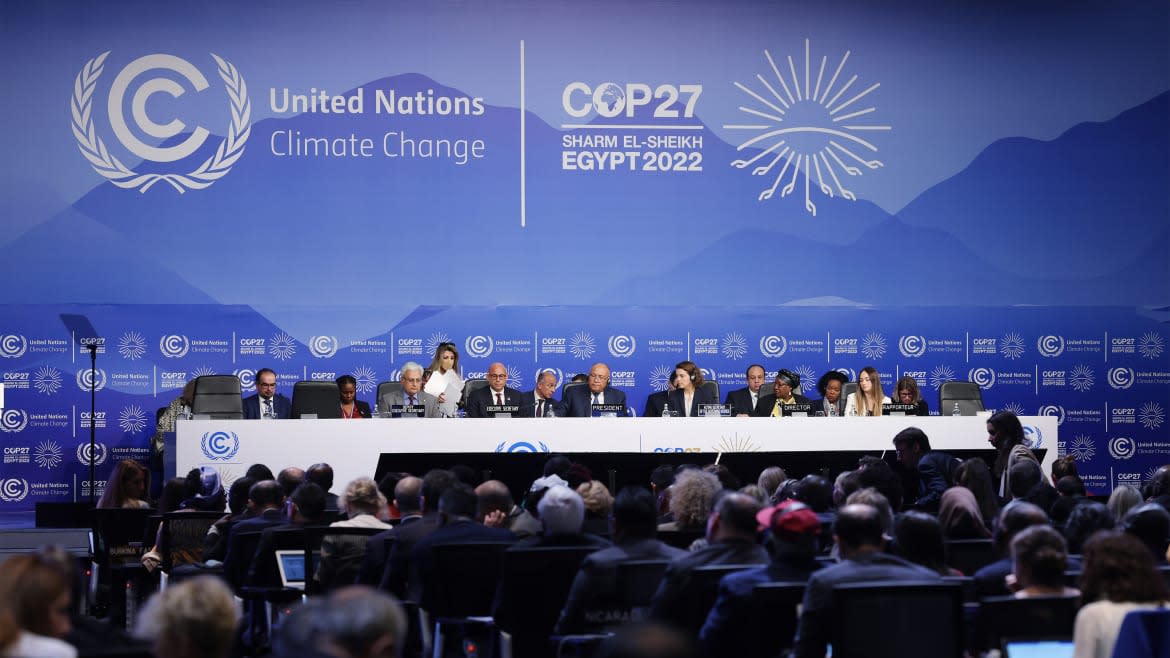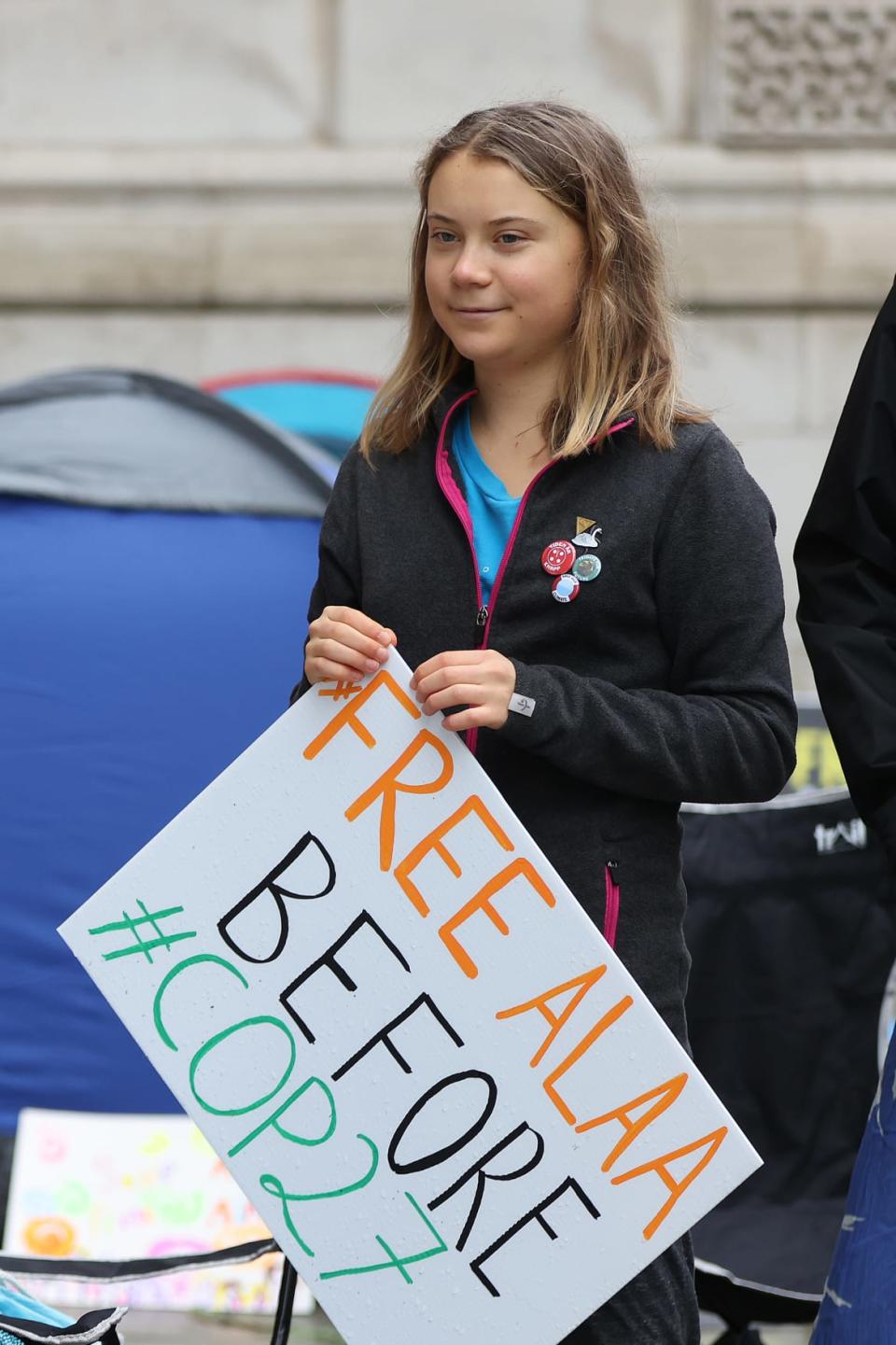It’s Time We Burn the UN Climate Conference to the Ground

- Oops!Something went wrong.Please try again later.
- Oops!Something went wrong.Please try again later.
If it wasn’t literally your job to cover it, you’d be forgiven for missing this year’s United Nations Climate Change Conference, COP27. The convergence of flashy news items—Elon Musk taking control of Twitter and promptly unleashing chaos throughout the company, the U.S. midterm elections, even the implosion of a major cryptocurrency exchange—leave little remaining oxygen for an annual climate conference.
And, if we’re being honest, the two-week gathering of world leaders in Sharm el-Sheikh, Egypt, hasn’t had much going for it. Xi Jinping and Vladimir Putin, the respective leaders of China and Russia, were not in attendance, even as the environmental impacts of U.S.-China relations and the war in Ukraine took center-stage. Greta Thunberg was also absent but accused conference attendees of “greenwashing, lying and cheating.” Indeed, some of the biggest climate news to come out of the past week didn’t even happen at the conference, like Monday’s announcement that Xi and U.S. President Joe Biden had agreed to restart climate talks between their two countries.
It’s clear that COP27 is no COP21, the 2015 conference held in Paris that led to the signing of the Paris Agreement. Instead, experts told The Daily Beast that this year’s COP will go down in infamy as the year the conference was revealed to be a true farce.
“It seems like Egypt is the nail in the coffin for environmental activists and those truly invested in transformative climate action and justice, and not just these small adjustments that seem to be getting us nowhere,” Mohammed Rafi Arefin, a geography and climate justice researcher at the University of British Columbia, told The Daily Beast..
He pointed to a slew of contradictions, including ongoing environmental destruction by the Egyptian government and the ongoing imprisonment of a prominent political activist, Alaa Abd El Fattah. Recent reports have highlighted other hypocrisies, such as a glut of fossil fuel lobbyists present at this year’s meeting, a year after the industry’s already outsized presence was uniformly criticized. Over a hundred more lobbyists registered for COP27, according to an analysis released last week by the international nonprofit Global Witness.
“After it was called out last year, how does this actually still happen?” Kat Maier, a national coordinator for Fridays For Future U.S., told The Daily Beast. That Hill+Knowlton, a PR firm that represents fossil fuel companies, is leading communications at the conference and Coca-Cola, one of the world’s leading plastics polluters, is hosting, only deepens activists’ skepticism about the meeting.

Climate activist Greta Thunberg protested the imprisonment of British-Egyptian activist Alaa Abd El-Fattah on October 30, 2022 in London, England ahead of COP27.
The core problem is that the people who have seats at the table overwhelmingly do not represent the interests of everybody else. Another report from NGO Oxfam International released to coincide with COP27 analyzed the emissions directly due to billionaires’ investments when they held 10 percent or higher stakes in a corporation. It found that 125 of the world’s richest billionaires each emit one million times more carbon annually than a person in the bottom 90 percent economically on average.
“A lot of the solutions have to be systemic,” Ashfaq Khalfan, director of climate justice at Oxfam America and one of the authors of the new report, told The Daily Beast. “But a lot of billionaires’ personal emissions are a matter of choice, and particularly with their investments, that's a very tangible way that they are choosing to invest in polluting industries.”
Billionaires, Khalfan said, have outsized economic and political influence—they both make up a disproportionate number of world leaders and have sway over the rest as donors, advisers, and private citizens. Additionally, their status affords them a buffer to climate-induced disasters that are ravaging millions around the globe. It’s no wonder then that their sense of urgency and ideas about climate policies showcased at COP27 feel out of touch at best.
Should Wealthy Carbon Emitters Foot the Bill for Climate Damage?
The result of hypocrisies and others, like rich nations’ failure to keep a $100 billion pledge to developing countries for climate adaptation and mitigation, is that “inconsistency and greenwashing” is on display this year, said Ioannis Ioannou, a strategy and entrepreneurship researcher at London Business School. When companies are given a larger platform than they deserve at the conference, it’s important to remember how their tenets may contradict the stated purpose of the COPs and drown out crucial marginalized perspectives.
“This is the only forum we have where each country should have an equal voice, and unfortunately, it is becoming a bit of a peacock competition,” Ioannou told The Daily Beast.
It’s clear that COP27 represents the beginning of a tailspin, but where we go from here depends on whether we want to jump out of the plane or try desperately to correct course, experts said. It would take an unprecedented international effort to move away from the COPs, Ioannou said, along the same lines as what would be needed for a “New Bretton Woods,” the post-World War II conference that created the International Monetary Fund and the World Bank.
“Can we come up with institutions that have science at their core, as opposed to science in an advisory role, which seems to be what we have now?” Ioannou said. “Moving beyond the COPs, are there more long-term oriented, science-based, democratic, inclusive institutional structures? Because that's what is needed to match the problem of climate change.”
Others like Khalfan said that reinventing the wheel at such a large scale is not likely to succeed, and that a best-case scenario is that leaders resuscitate a future conference with the ingredients that allowed the Paris Agreement to take shape. As most nations come to the annual meeting to coordinate, having made climate decisions ahead of time, countries that want to lead the conversation could innovate ahead of the curve by decarbonizing their economies; then, after they’ve shown it can be done, leaders can manufacture viral moments and spearhead change by calling out other nations reluctant to follow their lead, Khalfan said.
Green Hypocrisy Hangs Over This Year’s U.N. Climate Meeting
In 2015, small island developing states banded together and pushed for a goal of limiting global warming to 1.5 degrees Celsius instead of 2. Even though we are going to overshoot this goal, the intention that was agreed upon at COP21 mattered, Khalfan argued.
“One is absolutely catastrophic. One is just catastrophic,” he said.
Giving smaller nations and ones hard-hit by the effects of climate change greater bargaining power goes hand in hand with limiting external influences, Maier added.
“There are a few crucial decisions that could completely transform the way that this platform is used,” she said, including rethinking sponsorships and kicking out fossil fuel lobbyists who would prefer to keep to the status quo.
Because if this year is any indication, what the “status quo” means is that leaders at COP27 are fiddling while the world burns.
Got a tip? Send it to The Daily Beast here
Get the Daily Beast's biggest scoops and scandals delivered right to your inbox. Sign up now.
Stay informed and gain unlimited access to the Daily Beast's unmatched reporting. Subscribe now.

